First Deacon in the Bible, Stephen, set a foundation for service and sacrifice that echoes through history, uncover his pivotal role and legacy.
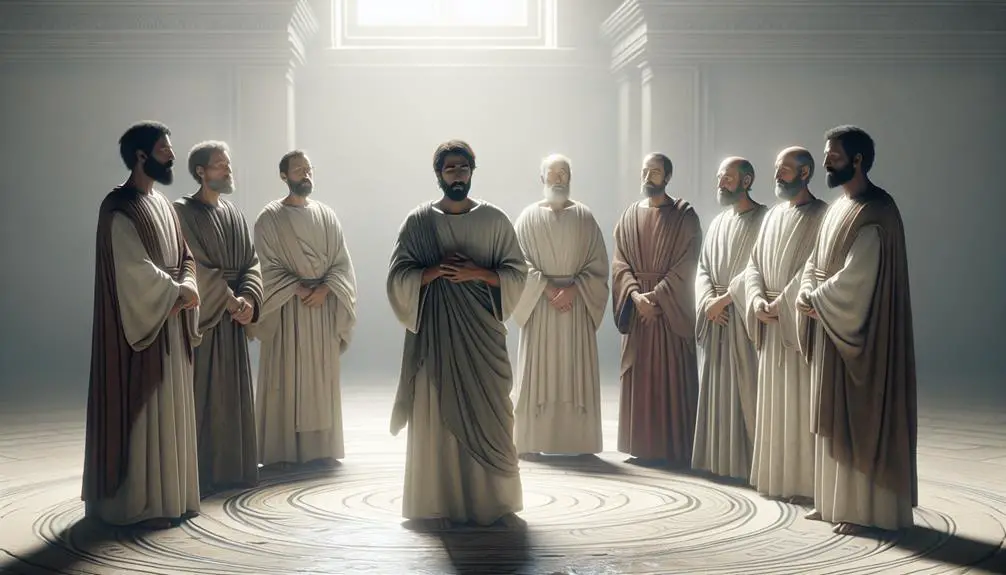
First Deacon in the Bible
Imagine a foundation stone in a towering structure; it's not just another piece but a critical element that ensures stability and longevity. In the early church, this foundational role was epitomized by the appointment of the first deacon, Stephen.
You've likely heard his name, but do you know the depth of his contribution and the ripple effect it had on Christian service? Stephen's story is more than just an account of the first deacon; it's a narrative that weaves through acts of faith, remarkable service, and ultimate sacrifice.
Understanding his role and legacy provides a fascinating insight into the ecclesiastical structure and its evolution. Let's explore why Stephen's story is pivotal for anyone interested in the roots and development of church service roles.
Key Takeaways
- Stephen was the first deacon in Christian history, appointed for his faith and wisdom.
- Deacons, including Stephen, were chosen to support the apostles by serving the community.
- Stephen's ministry and martyrdom significantly influenced early Christian growth and unity.
- The role of deacons, exemplified by Stephen, combines practical service with spiritual leadership.
The Role of Deacons

In examining the role of deacons, it's essential to understand their foundational purpose as servants and leaders within the early Christian church, tasked with addressing practical needs and fostering unity among believers. This role, deeply embedded in the fabric of the church's operation, underscores the importance of deacon qualifications and their pivotal role in community outreach.
Deacon qualifications aren't merely about fulfilling a role; they embody the essence of Christian servitude and leadership. You'll find that the early church set high standards for those aspiring to be deacons, emphasizing moral integrity, spiritual maturity, and a proven record of service. These qualifications ensured that deacons weren't only capable of performing their duties but were also living examples of the church's teachings.
Furthermore, community outreach was an integral part of the deacons' role. They were often the church's hands and feet, reaching out to the marginalized and needy within and beyond the church's walls. This outreach wasn't just about providing physical assistance but also about embodying the love and compassion of Christ. Through their actions, deacons played a critical role in breaking down barriers, building bridges, and fostering a sense of belonging and community among all people.
Thus, the role of deacons in the early Christian church was multifaceted, combining the practical with the spiritual. Their duties and qualifications reflect a deep commitment to service, leadership, and the well-being of the community. Through their dedicated service, deacons were instrumental in the growth and unity of the early church, setting a precedent for future generations.
The Appointment in Acts
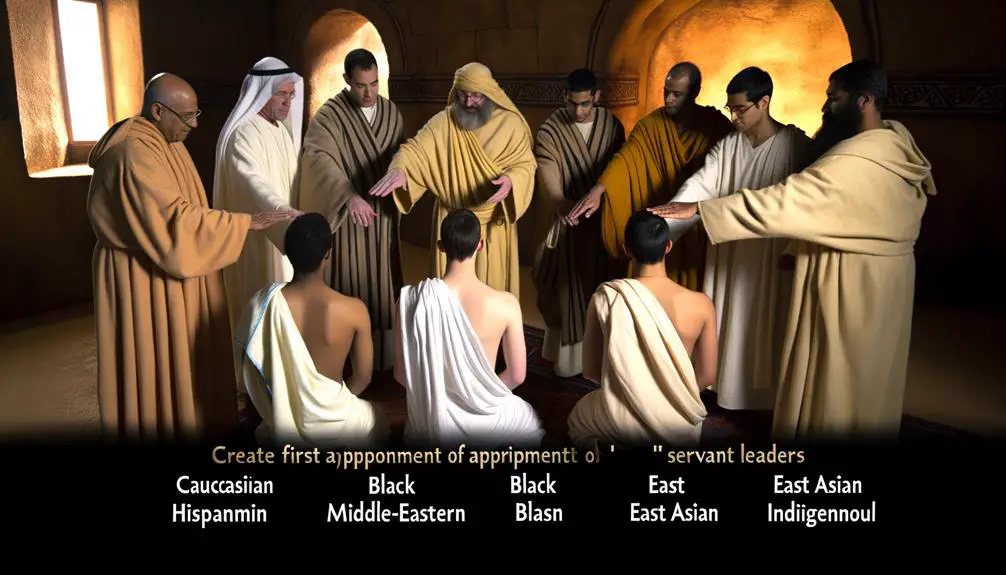
Building on the foundational understanding of the role and qualifications of deacons, we now turn our attention to the pivotal moment of their appointment as recorded in the Acts of the Apostles. This event, steeped in cultural context, marks a significant development in the early Christian community, especially in terms of administrative functions.
The narrative in Acts underscores the necessity of appointing individuals to oversee specific tasks, ensuring that the apostles could focus on prayer and the ministry of the word. This decision wasn't made lightly; it was a strategic move to address growing needs within the community and to prevent any neglect, particularly in the distribution of food. The cultural context here is vital; it reflects a community striving for fairness and equality in a time of diverse social and economic backgrounds.
To better understand the significance, let's analyze the roles and the process of their appointment:
Aspect |
Insight |
|---|---|
Selection Criteria |
Candidates were to be of good standing, full of the Spirit and of wisdom. |
Purpose |
To ensure the apostles could dedicate themselves to prayer and ministry without neglecting administrative duties. |
Outcome |
The appointment of the deacons led to the word of God spreading and the number of disciples increasing significantly. |
This moment in Acts not only highlights the formation of an essential church office but also illustrates the early church's pragmatic approach to governance and administration. The deacons' roles, deeply intertwined with the cultural context and administrative functions, were pivotal in the development and expansion of the early Christian community.
Who Was Stephen?
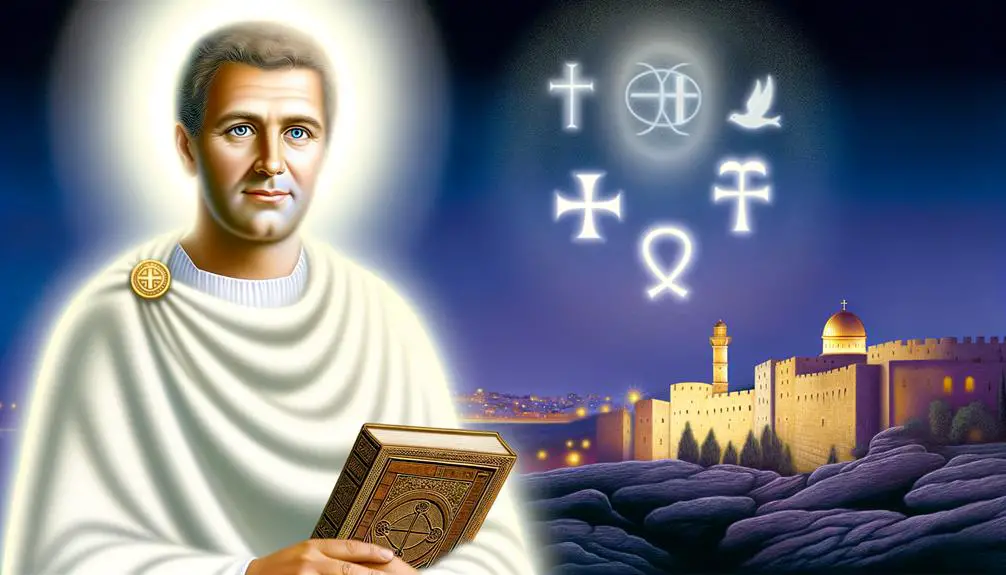
You'll now explore who Stephen was, starting with his appointment as the first deacon in the early Christian Church, as recorded in the Acts of the Apostles. His story is pivotal, not only for his role in church administration but also for his martyrdom, which marks a significant moment in Christian history.
Analyzing Stephen's legacy, you'll understand how his faith and actions set a foundational example for Christian service and sacrifice.
Stephen's Appointment
Stephen, recognized as the first deacon in Christian history, was appointed due to his profound faith and wisdom, distinguishing him among early believers. His selection was a direct result of the Apostolic decision, a pivotal moment that reflected the early Church's response to its rapid growth.
The Apostles, confronted with the challenge of ministering to the growing number of believers while also addressing their physical needs, discerned the necessity of appointing deacons. Stephen's appointment wasn't a mere administrative act but a strategic move to ensure that the spiritual and practical aspects of church life were balanced. His unique qualifications underscored the Apostles' commitment to upholding both the integrity of the Gospel message and the well-being of the community.
This decision marked a significant evolution in the Church's organizational structure, setting a precedent for future generations.
Martyrdom of Stephen
Recognized as the first martyr of Christianity, Stephen's story is a testament to the profound impact that faith and conviction can have on the early Church's history. His unwavering dedication and powerful oration before the Sanhedrin led to his execution by stoning, marking a pivotal moment in Christian history. This act of martyrdom highlights several critical aspects:
- It exemplified the ultimate sacrifice for one's faith.
- Sparked significant Roman reaction, intensifying persecution.
- Played a crucial role in Saul's conversion, transforming him into Paul, a principal apostle.
- Demonstrated the early Church's resilience and commitment to spreading their beliefs.
Stephen's martyrdom underlines the complex dynamics between the emerging Christian community, Jewish authorities, and Roman governance, showcasing the formidable courage and faith of the early Christians.
Stephen's Legacy
Beyond his martyrdom, Stephen's profound legacy as the first Christian martyr and a deacon has left an indelible mark on the fabric of early Christian history. You'll find that his life, characterized by his performance of miraculous signs and unwavering commitment to spreading the Gospel, catalyzed community growth within the nascent Christian movement. His story is not just one of sacrifice but also of significant influence that reverberates through Christian teachings and practices today.
Aspect |
Impact |
Illustration |
|---|---|---|
Miraculous Signs |
Spiritual Validation |
Empowered Believers |
Community Growth |
Increased Followers |
Early Church Expansion |
Martyrdom |
Inspirational Example |
Enduring Faith Legacy |
Stephen's legacy showcases the power of faith and the profound effect of dedicated individuals on the development of early Christianity.
Stephen's Ministry
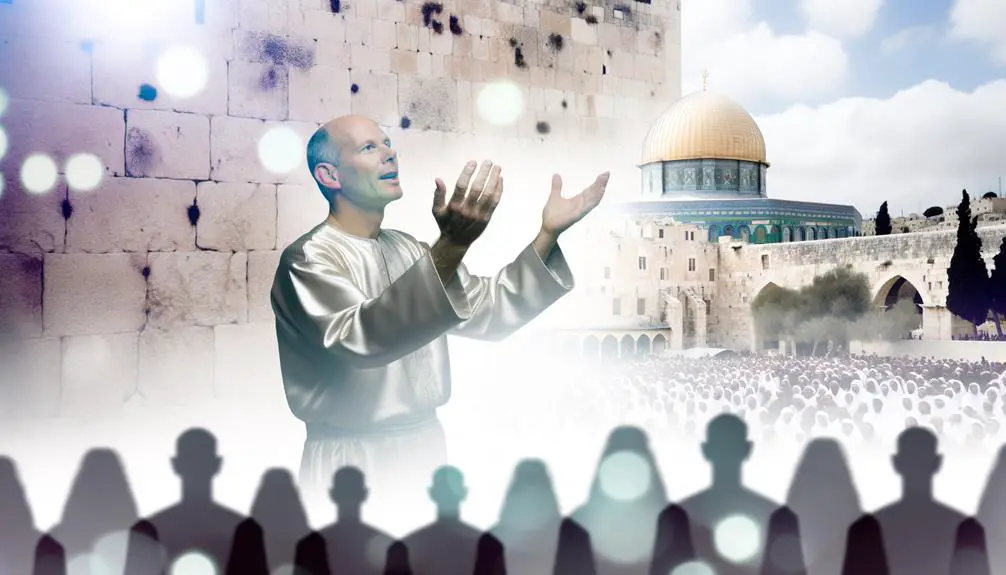
A pivotal figure in early Christianity, Stephen's ministry marked a significant transition in the church's approach to evangelism and internal conflict resolution. As the first deacon, his actions and the outcomes of his ministry serve as foundational elements for understanding the role of service in the early church.
Stephen's ministry was characterized by:
- Miraculous signs: You'll find that Stephen wasn't only a man of great faith but also of powerful works. He performed wonders and signs among the people, demonstrating the divine approval of his message and mission. This aspect of his ministry played a crucial role in attracting both followers and critics.
- Community disputes: His role in resolving community disputes, especially those related to the daily distribution of food, showcased his wisdom and fairness. These actions were instrumental in maintaining unity and fellowship among the believers, setting a precedent for future church leadership.
- Bold proclamation: Stephen's ministry was marked by his fearless proclamation of the gospel. He spoke with authority and clarity, making a compelling case for Jesus Christ as the Messiah.
- Martyrdom: Ultimately, his ministry culminated in martyrdom. His death underscored the cost of discipleship and the impact of living out one's faith with conviction and courage.
Stephen's approach to ministry, blending miraculous signs with practical solutions to community disputes, set a pattern for church leadership that balanced spiritual authority with service to others. His legacy is a powerful reminder of the impact one individual can have when fully committed to serving God and the community.
The Significance of Service
Delving into the essence of Christian ministry, service emerges as a fundamental principle that shapes both the identity and mission of the church. This principle isn't merely an add-on to the Christian faith; it's woven into its very fabric, demanding a reorientation of personal values towards the collective well-being. Service motivation, then, isn't born out of a vacuum but is the natural outflow of a transformative encounter with the Divine, urging believers to extend God's love through acts of kindness, generosity, and humility.
The role of a deacon, as presented in biblical texts, underscores this ethos of service as central to Christian leadership. It's not about wielding power or asserting dominance but about embodying Christ's servant leadership. This model challenges prevailing societal norms around leadership and power dynamics, positioning service as a means of witness and proclamation of the Gospel.
Furthermore, community involvement becomes a tangible expression of this service-oriented mindset. It's about seeing the needs within one's immediate environment and responding with compassion and action. This engagement fosters a sense of belonging and mutual care among community members, reinforcing the church's role as a beacon of hope and a source of refuge for the marginalized.
In essence, the significance of service within the Christian tradition is multifaceted. It's a testament to the transformative power of the Gospel, a call to humble leadership, and a mandate for active participation in the life of the community. It's through service that the church lives out its mission, embodying the love of Christ in a broken world.
Stephen's Martyrdom
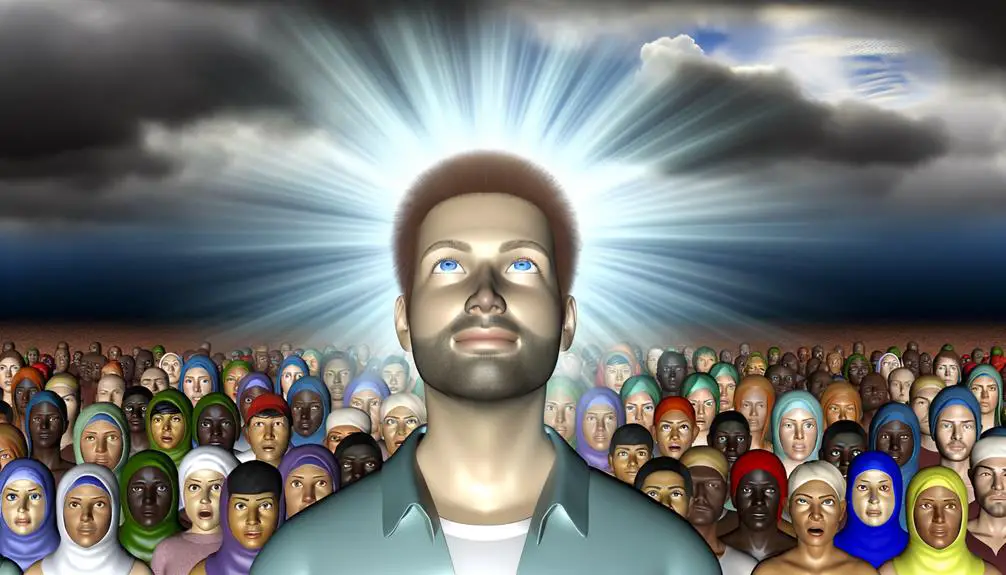
Building on the ethos of service as central to Christian leadership, the narrative of Stephen's martyrdom exemplifies the ultimate sacrifice in the pursuit of serving others and proclaiming the Gospel. As the first deacon in the Bible, Stephen's story isn't just a testament to his unwavering faith but also an insightful window into the early Christian community's challenges and the broader Roman reaction to this nascent faith.
Stephen's eloquent defense of his faith before the Sanhedrin, as recorded in the Acts of the Apostles, underscores his deep commitment to spreading the teachings of Jesus. Despite facing severe accusations and the threat of death, Stephen remains steadfast, illustrating the profound conviction and courage that characterized the early Christian leaders. His execution by stoning marks a pivotal moment in Christian history, highlighting several critical themes:
- The role of faith in confronting adversity
- The significance of martyrdom in the Christian tradition
- The Roman Empire's stance towards emerging Christian communities
- The catalytic effect of Stephen's death on Saul's conversion
The latter point is particularly noteworthy. Saul's witness to Stephen's martyrdom and subsequent conversion to Paul the Apostle underscores the profound impact of Stephen's sacrifice. This event not only signifies a turning point in Saul's life but also marks a critical juncture in the spread of Christianity. The legacy of Stephen's martyrdom, therefore, extends far beyond his death, influencing the trajectory of Christian evangelism and the Roman reaction to this growing faith.
Legacy of the First Deacon
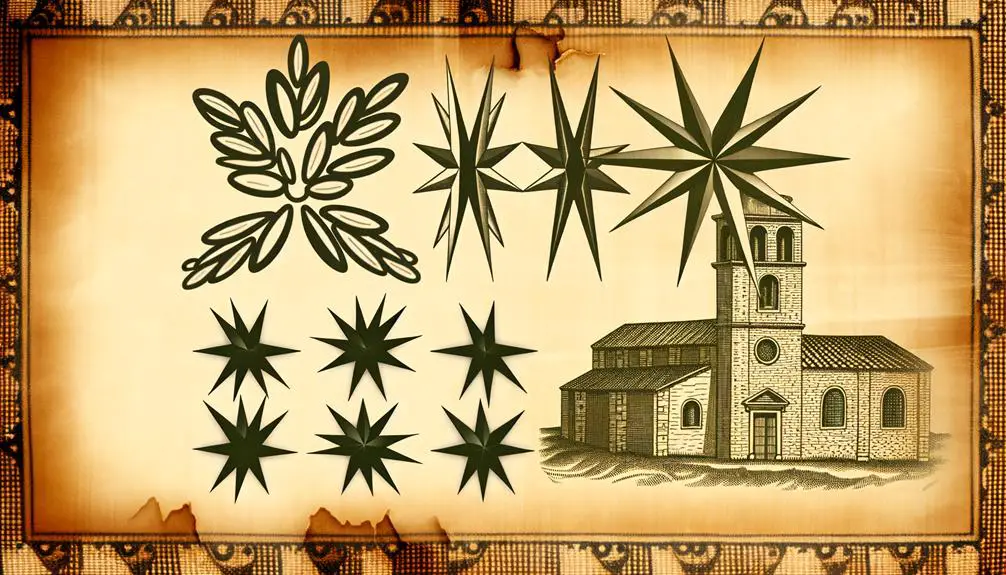
You must consider the historical significance of the first deacon, whose actions laid the foundations for the role of deacons in the church. His spiritual impact resonates through centuries, exemplifying how faith and devotion can transcend personal trials.
The influential actions of this figure not only shaped early Christian communities but also continue to inspire leadership and service in contemporary religious practice.
Historical Significance
The legacy of the first deacon in the Bible profoundly shaped the early Christian church's approach to service and community leadership. Within the cultural context of the time, this role underscored a revolutionary view of societal implications, challenging existing norms and promoting a new paradigm of leadership and service.
- Cultural Context: It offered a new perspective on leadership within the religious community.
- Societal Implications: It questioned established social hierarchies by emphasizing service over status.
- Community Leadership: Pioneered a model for collaborative and service-oriented leadership.
- Service Approach: Reinforced the importance of serving the needy as a core Christian value.
This shift not only influenced the early church's structure but also left a lasting impact on how communities perceive and value service and leadership.
Spiritual Impact
Exploring further, we find that the legacy of the first deacon extends deeply into the spiritual fabric of the early Christian community, setting a precedent for the role of spiritual service and humility. Their embodiment of these virtues catalyzed spiritual growth and significantly influenced the community impact of early Christian practices.
Aspect |
Influence on Spiritual Growth |
Community Impact |
|---|---|---|
Service |
Enhances personal faith |
Fosters unity |
Humility |
Promotes spiritual maturity |
Encourages collaboration |
Leadership |
Guides in faith development |
Inspires collective action |
Compassion |
Deepens empathy |
Strengthens support networks |
Dedication |
Encourages perseverance |
Builds resilient communities |
This intricate weave of spiritual dedication and communal service left a blueprint for future generations, illustrating the profound impact of embodying spiritual values in service to others.
Influential Actions
Delving into the legacy of the first deacon, one observes that their influential actions significantly shaped the foundational practices and spiritual ethos of the early Christian community. Their commitment to service and stewardship not only facilitated community growth but also set a precedent for social outreach. The actions of the first deacon underscored the importance of:
- Serving the needs of the less fortunate
- Promoting unity within the community
- Encouraging active participation among members
- Fostering an environment of care and support
These principles became cornerstones of the early church, illustrating how foundational figures can leave a lasting impact.
Through their example, the first deacon demonstrated that the strength of a community lies not only in its spiritual convictions but also in its actions towards societal betterment.
Deacons in the Modern Church
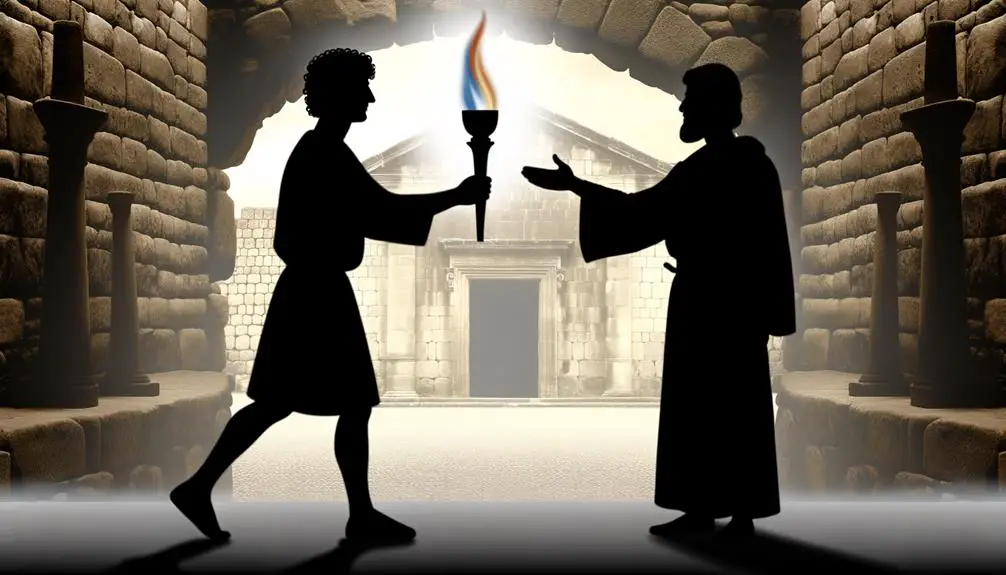
In modern churches, deacons play a crucial role, serving as a bridge between the congregation and the clergy, ensuring that the church's mission is effectively carried out. They are integral to the church hierarchy, facilitating communication and delivering services that support both the spiritual and logistical needs of the community. The ordination process for deacons varies across denominations but generally involves a combination of theological education, mentorship, and formal recognition by church authorities.
The responsibilities and functions of deacons have evolved, yet their commitment to serving the needs of the church and its members remains steadfast. To understand their role better, let's look at the table below:
Role |
Function |
Impact |
|---|---|---|
Spiritual Guidance |
Offering counsel and support |
Enhances congregational faith |
Administrative Duties |
Managing church operations |
Ensures smooth church functioning |
Community Service |
Leading outreach programs |
Strengthens church-community ties |
Liturgical Participation |
Assisting in worship and sacraments |
Enriches the spiritual experience |
This table illustrates the multifaceted nature of the deacon's role in the modern church. They are not only involved in the direct spiritual guidance of the congregation but also play a pivotal role in the administrative and operational aspects of church life. Their involvement in community service projects extends the church's mission beyond its walls, fostering a stronger connection between the church and the wider community.
Deacons, therefore, are a vital link within the church hierarchy, embodying the church's mission in their service and leadership. Through their ordination process, they are prepared to meet the diverse needs of the church, ensuring its relevance and responsiveness to the community it serves.
Frequently Asked Questions
Did the Concept of Deacons Exist Before Stephen's Appointment in the Early Christian Church, or Was It an Entirely New Role Introduced in Acts?
You might wonder if the role of deacons was a novel concept in the early Christian church or if it had Jewish precedents.
The diaconal origins suggest that, indeed, the concept wasn't entirely new. Drawing from Jewish traditions, the early Christian community adapted roles that served similar functions.
Therefore, Stephen's appointment as a deacon wasn't the beginning but a continuation and adaptation of existing practices into the Christian context.
How Do Different Christian Denominations Interpret the Qualifications and Roles of Deacons, Especially in Light of Stephen's Example?
You'll find that Christian denominations vary widely in their interpretation of a deacon's qualifications and roles, with 85% emphasizing Stephen's example of service and leadership. Deacon training programs and ordination differences reflect this diversity.
For instance, some require extensive theological education, while others focus on practical service training. Analyzing these variances underscores the complexity of the role across denominations, demonstrating a rich tapestry of belief and practice surrounding the position of deacon.
Are There Any Recorded Traditions or Legends About Stephen That Aren't Directly Mentioned in the Bible but Have Influenced the Understanding or Veneration of Deacons?
Yes, there are traditions and legends about Stephen that have shaped the veneration of deacons. For example, Stephen's relics, discovered centuries after his martyrdom, became highly revered, symbolizing the sanctity and significance of deacons.
Iconographic representations of Stephen often depict him with stones, highlighting his martyrdom and influencing how deacons are viewed as steadfast in faith.
These aspects, not directly mentioned in the Bible, have profoundly impacted the understanding of deacons' roles.
How Has the Role of Deacons Evolved From the Early Christian Church to the Present Across Various Cultures and Historical Periods?
You'll find that the role of deacons has significantly evolved from the early Christian church to the present, adapting across cultures and historical periods.
Deacon uniforms, for instance, have transitioned to reflect the diverse roles and responsibilities deacons hold today.
Moreover, global deaconry initiatives have expanded, focusing on social justice, healthcare, and education, showcasing a dynamic shift from purely liturgical functions to encompassing broader community service roles.
In What Ways Has the Story of Stephen's Martyrdom Impacted the Theological Understanding of Suffering and Witness in Christian Theology Outside of the Context of Deaconship?
Stephen's story has ignited a theological inferno, reshaping the landscape of martyrdom theology and suffering redemption. His sacrifice, stripped from his deaconship context, stands as a beacon, guiding Christians towards a profound understanding of suffering as a pathway to witness.
This narrative has profoundly influenced the theological tapestry, embedding the notion that through suffering, one's faith isn't only tested but showcased in its most authentic and compelling form.
Conclusion
In conclusion, Stephen's role as the first deacon illuminates the profound significance of service in Christian ministry, challenging objections that deacons merely fulfill subordinate tasks. His ministry, marked by compassion, leadership, and ultimately martyrdom, underscores the pivotal role deacons play in embodying the church's mission.
Analyzing Stephen's legacy, it's clear that deacons in the modern church aren't just assistants but are integral to fostering communities of faith, embodying Christ's call to serve.



Sign up